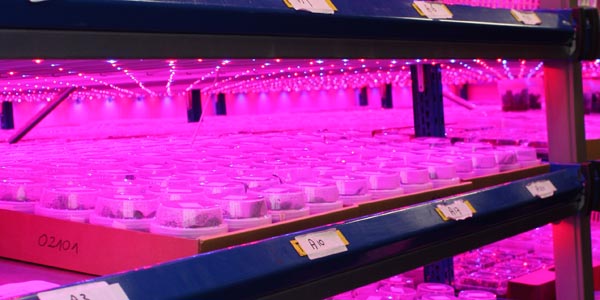
May 16, 2012, by Fraser
Farming may not always be just as we know it….
Dr John Strak, Honorary Professor in Food Economics at The University of Nottingham, talks vertical farming…
A meeting on our Jubilee Campus last week gave me the chance to catch up on some new developments in science and, with about 100 others, to share ideas on what vertical farming can contribute to global food security.
We were gathered together at a vertical farming workshop organised by Dr Chungui Lu and colleagues from the School of Biosciences, the Faculty of Engineering, and the Department of Architecture and the Built Environment. Over a full day the workshop’s agenda saw contributions from the University’s researchers and from external scientists and practitioners.
Vertical farming
Some of the discussions were at the very edge of the research frontier and, when I returned home that evening and was asked , what is vertical farming, I fell back on popular science fiction and replied, “It’s farming, Jim, but not as we know it”. You can see what I mean by visiting the International Vertical Farming Workshop’s website.
The discussions at the workshop convinced me that this is a subject that will undoubtedly occupy a significant amount of researchers’ time and resources in the years ahead. Vertical farming is, essentially, about how we allocate resources in a way that gets more from less – and that must be a prerequisite for actions that improve food security.
In our workshop we were given insights into: how building design might be able to accommodate crops, how plants can improve yields and the utilization of nutrients, and how vermionics and fish farming can link with vertical farming systems to increase productivity dramatically.
Chinese involvement
We were also given a presentation by visitors from the Chinese Academy of Agricultural Sciences in Beijng on the work they are doing, and from researchers working with new forms of lighting and other technologies that improve yields for crops and animals, and an update on the engineering challenges posed by the Sahara forest project in Qatar.
From this brief summary you can imagine that there was a lot to talk about on the day and many new ideas and concepts were explored. And while these were mainly scientific issues, the discussions in the workshop also touched on the socioeconomic aspects of urban and office developments that were designed to have a role in food production.
Cutting edge research
The workshop also illustrated a wider truth about food security. Namely, that the solutions that will feed the world and ensure that resources are used most effectively in food production will be based upon the application of cutting edge research in science, engineering, architecture, and the social sciences.
In finding these solutions we will need to work collaboratively and in multidisciplinary teams, and we will test our views about the future of food production to the limit. Most of all, we will have to be bold in our research and where it leads us – even if the resulting farming system isn’t quite as we have known in the past.
No comments yet, fill out a comment to be the first

Leave a Reply